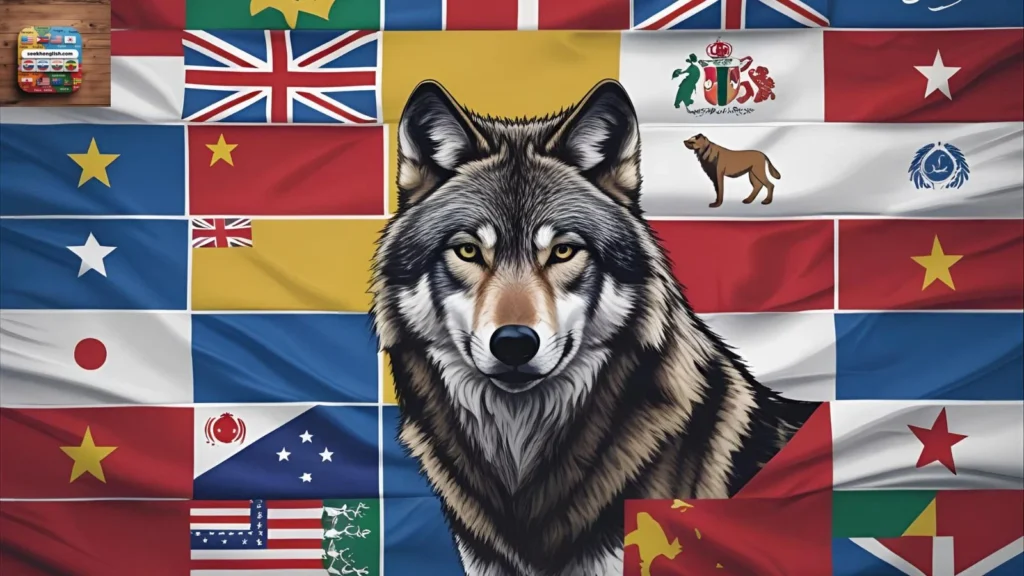The word “wolf” is powerful and symbolic in many cultures, often representing strength, freedom, and mystery. If you’re curious about how to say wolf in other languages — whether for learning, writing, naming, or fun — this guide gives you the translation, pronunciation, and an example sentence in 85+ different languages. Explore how people around the world describe this majestic animal! Wolf in Other Languages.
How to Say “wolf in other languages” in 85 Different Languages

Read More: “Green” in Other Languages
- Spanish 🇪🇸 – lobo | Pronunciation: LOH‑bo
Example: “El lobo aúlla en la noche.” (“The wolf howls at night.”) - French 🇫🇷 – loup | Pronunciation: LOO
Example: “Le loup vit en meute.” (“The wolf lives in a pack.”) - German 🇩🇪 – Wolf | Pronunciation: VOLF
Example: “Der Wolf ist scheu.” (“The wolf is shy.”) - Russian 🇷🇺 – волк | Pronunciation: VOLK
Example: “Этот волк сильный.” (“This wolf is strong.”) - Chinese 🇨🇳 – 狼 | Pronunciation: LAHNG
Example: “那只狼很凶。” (“That wolf is fierce.”) - Arabic 🇸🇦 – ذئب | Pronunciation: THEEB
Example: “الذئب يعيش في الغابة.” (“The wolf lives in the forest.”) - Hindi 🇮🇳 – भेड़िया | Pronunciation: BHE‑DEE‑yaa
Example: “भेड़िया चुपके से चलता है।” (“The wolf moves stealthily.”) - Swahili 🇰🇪 – mbwa mwitu | Pronunciation: M‑bwah M‑wee‑tu
Example: “Mlinda mbwa mwitu.” (“He protects the wolf.”) - Finnish 🇫🇮 – susi | Pronunciation: SOO‑see
Example: “Susi metsässä ulvoo.” (“The wolf howls in the forest.”) - Turkish 🇹🇷 – kurt | Pronunciation: KOORT
Example: “Kurt yalnız gezer.” (“The wolf wanders alone.”) - Polish 🇵🇱 – Wilk | Pronunciation: VEELK
Example: “Wilk poluje nocą.” (“The wolf hunts at night.”) - Japanese 🇯🇵 – 狼 | Pronunciation: OOKA‑mi
Example: “狼が月に吠える。” (“The wolf howls at the moon.”) - Italian 🇮🇹 – lupo | Pronunciation: LOO‑po
Example: “Il lupo corre veloce.” (“The wolf runs fast.”) - Portuguese 🇵🇹 – lobo | Pronunciation: LOH‑boo
Example: “O lobo uiva para a lua.” (“The wolf howls at the moon.”) - Bengali 🇧🇩 – নেকড়ে | Pronunciation: NEH‑kre
Example: “নেকড়ে বন দিয়ে হাঁটে।” (“The wolf walks through the forest.”) - Ukrainian 🇺🇦 – вовк | Pronunciation: VOVK
Example: “Вовк живе в лісі.” (“The wolf lives in the forest.”) - Korean 🇰🇷 – 늑대 | Pronunciation: NEUK‑dae
Example: “늑대가 달을 향해 울부짖는다.” (“The wolf howls at the moon.”) - Greek 🇬🇷 – λύκος | Pronunciation: LEE‑kos
Example: “Ο λύκος τρέχει στο δάσος.” (“The wolf runs in the forest.”) - Vietnamese 🇻🇳 – sói | Pronunciation: SOY
Example: “Con sói đang săn mồi.” (“The wolf is hunting prey.”) - Romanian 🇷🇴 – lup | Pronunciation: LOOP
Example: “Lupul urlă în noapte.” (“The wolf howls in the night.”) - Persian (Farsi) 🇮🇷 – گرگ | Pronunciation: GORg
Example: “گرگ در کوهها زندگی میکند.” (“The wolf lives in the mountains.”) - Dutch 🇳🇱 – wolf | Pronunciation: WOLF
Example: “De wolf jaagt in het bos.” (“The wolf hunts in the forest.”) - Czech 🇨🇿 – vlk | Pronunciation: VLK
Example: “Vlk se pohybuje tiše.” (“The wolf moves quietly.”) - Hungarian 🇭🇺 – farkas | Pronunciation: FAR‑kash
Example: “A farkas a vadonban él.” (“The wolf lives in the wild.”) - Thai 🇹🇭 – หมาป่า | Pronunciation: Maa‑Paa
Example: “หมาป่าหอนตอนกลางคืน.” (“The wolf howls at night.”) - Indonesian 🇮🇩 – serigala | Pronunciation: SEH‑ree‑GAH‑lah
Example: “Serigala berlari di hutan.” (“The wolf runs in the forest.”) - Hebrew 🇮🇱 – זאב | Pronunciation: ZEH‑ev
Example: “הזאב חזק ומהיר.” (“The wolf is strong and fast.”) - Malay 🇲🇾 – serigala | Pronunciation: SEH‑ree‑GAH‑lah
Example: “Serigala tinggal di hutan.” (“The wolf lives in the jungle.”) - Norwegian 🇳🇴 – ulv | Pronunciation: UHLV
Example: “Ulv lever i villmarken.” (“The wolf lives in the wilderness.”) - Swedish 🇸🇪 – varg | Pronunciation: VARG
Example: “Vargen ylar mot månen.” (“The wolf howls at the moon.”) - Danish 🇩🇰 – ulv | Pronunciation: OOLV
Example: “Ulv vandrer gennem skoven.” (“The wolf wanders through the forest.”) - Filipino (Tagalog) 🇵🇭 – lobo | Pronunciation: LOH‑boh
Example: “Ang lobo ay naninirahan sa kagubatan.” (“The wolf lives in the forest.”) - Turkmen 🇹🇲 – gurt | Pronunciation: GOORT
Example: “Gurt çöldä ýaşaýar.” (“The wolf lives in the desert.”) - Tamil 🇮🇳 – ஓநாய் | Pronunciation: O‑Naai
Example: “ஓநாய் காடில் வசிக்கிறது.” (“The wolf lives in the forest.”) - Telugu 🇮🇳 – తోడేలు | Pronunciation: TO‑day‑lu
Example: “తోడేలు రాత్రి అరిస్తుంది.” (“The wolf howls at night.”) - Punjabi 🇮🇳 – ਭੇੜੀਆ | Pronunciation: BHAY‑dee‑aa
Example: “ਭੇੜੀਆ ਜੰਗਲ ਵਿਚ ਰਹਿੰਦਾ ਹੈ।” (“The wolf lives in the jungle.”) - Marathi 🇮🇳 – लांडगा | Pronunciation: LAAN‑duh‑gaa
Example: “लांडगा रात्री ओरडतो.” (“The wolf howls at night.”) - Sinhala 🇱🇰 – වෘකයා | Pronunciation: Vru‑ka‑yaa
Example: “වෘකයා වනයේ හැඳින්වේ.” (“The wolf is known in the forest.”) - Nepali 🇳🇵 – ब्वाँसो | Pronunciation: Bwan‑so
Example: “ब्वाँसो जंगलमा बस्छ।” (“The wolf lives in the jungle.”) - Urdu 🇵🇰 – بھیڑیا | Pronunciation: BHE‑ri‑yaa
Example: “بھیڑیا رات میں چلتا ہے۔” (“The wolf walks at night.”) - Pashto 🇦🇫 – لېوه | Pronunciation: Leh‑wah
Example: “لېوه په ځنګل کې ګرځي.” (“The wolf roams in the forest.”) - Malayalam 🇮🇳 – ചെന്നായ | Pronunciation: Chen‑naai
Example: “ചെന്നായ കാട്ടിൽ ജീവിക്കുന്നു.” (“The wolf lives in the woods.”) - Kannada 🇮🇳 – ತೋಳ | Pronunciation: Tho‑la
Example: “ತೋಳ ರಾತ್ರಿ ಕೂಗುತ್ತದೆ.” (“The wolf howls at night.”) - Gujarati 🇮🇳 – વરુ | Pronunciation: Va‑roo
Example: “વરુ જંગલમાં દોડે છે.” (“The wolf runs in the forest.”) - Bulgarian 🇧🇬 – вълк | Pronunciation: VULK
Example: “Вълкът живее в гората.” (“The wolf lives in the forest.”) - Serbian 🇷🇸 – вук | Pronunciation: VOOK
Example: “Вук ноћу завија.” (“The wolf howls at night.”) - Croatian 🇭🇷 – vuk | Pronunciation: VOOK
Example: “Vuk luta šumom.” (“The wolf roams the forest.”) - Slovak 🇸🇰 – vlk | Pronunciation: VLK
Example: “Vlk vyje na mesiac.” (“The wolf howls at the moon.”) - Slovenian 🇸🇮 – volk | Pronunciation: VOLK
Example: “Volk teče po gozdu.” (“The wolf runs through the forest.”) - Bosnian 🇧🇦 – vuk | Pronunciation: VOOK
Example: “Vuk živi u šumi.” (“The wolf lives in the woods.”) - Lithuanian 🇱🇹 – vilkas | Pronunciation: VIL‑kas
Example: “Vilkas kaukia naktį.” (“The wolf howls at night.”) - Latvian 🇱🇻 – vilks | Pronunciation: VILKS
Example: “Vilks dzīvo mežā.” (“The wolf lives in the forest.”) - Estonian 🇪🇪 – hunt | Pronunciation: HOONT
Example: “Hunt ulub kuu poole.” (“The wolf howls at the moon.”) - Belarusian 🇧🇾 – воўк | Pronunciation: VOWK
Example: “Воўк жыве ў лесе.” (“The wolf lives in the forest.”) - Icelandic 🇮🇸 – úlfur | Pronunciation: OOL‑fur
Example: “Úlfurinn fer um skóginn.” (“The wolf wanders in the forest.”) - Irish 🇮🇪 – mac tíre | Pronunciation: MAHK TEE‑reh
Example: “Tá an mac tíre fiáin.” (“The wolf is wild.”) - Welsh 🏴 – blaidd | Pronunciation: BLYTHE
Example: “Mae’r blaidd yn udo.” (“The wolf is howling.”) - Afrikaans 🇿🇦 – wolf | Pronunciation: WOLF
Example: “Die wolf jag in die bos.” (“The wolf hunts in the forest.”) - Zulu 🇿🇦 – impisi | Pronunciation: EEM‑pee‑see
Example: “Impisi ikhala ebusuku.” (“The wolf howls at night.”) - Xhosa 🇿🇦 – impisi | Pronunciation: EEM‑pee‑see
Example: “Impisi ihamba ehlathini.” (“The wolf walks in the forest.”) - Yoruba 🇳🇬 – ikooko | Pronunciation: EE‑koo‑ko
Example: “Ikooko n gbe igbo.” (“The wolf lives in the forest.”) - Hausa 🇳🇬 – kura | Pronunciation: KOO‑rah
Example: “Kura tana cikin daji.” (“The wolf is in the bush.”) - Somali 🇸🇴 – yey | Pronunciation: YEH‑yeh
Example: “Yeygu wuu ordayaa.” (“The wolf is running.”) - Mongolian 🇲🇳 – чоно | Pronunciation: CHOH‑no
Example: “Чоно ойд амьдардаг.” (“The wolf lives in the forest.”) - Kazakh 🇰🇿 – қасқыр | Pronunciation: KAS‑kur
Example: “Қасқыр орманда жүреді.” (“The wolf roams in the forest.”) - Uzbek 🇺🇿 – bo‘ri | Pronunciation: BOO‑ree
Example: “Bo‘ri tungi paytida uvladi.” (“The wolf howled at night.”) - Kyrgyz 🇰🇬 – карышкыр | Pronunciation: KAR‑ish‑kur
Example: “Карышкыр токойдо жашайт.” (“The wolf lives in the forest.”) - Georgian 🇬🇪 – მგელი | Pronunciation: MGEL‑i
Example: “მგელი ტყეში ცხოვრობს.” (“The wolf lives in the forest.”) - Armenian 🇦🇲 – գայլ | Pronunciation: GAYL
Example: “Գայլը գիշերով ոռնում է։” (“The wolf howls at night.”) - Albanian 🇦🇱 – ujk | Pronunciation: OYK
Example: “Ujku jeton në pyll.” (“The wolf lives in the forest.”) - Basque (Euskara) 🇪🇸 – otso | Pronunciation: OT‑so
Example: “Otsoak gauaz uluka egiten du.” (“The wolf howls at night.”) - Esperanto 🌍 – lupo | Pronunciation: LOO‑po
Example: “La lupo loĝas en la arbaro.” (“The wolf lives in the forest.”) - Haitian Creole 🇭🇹 – lou | Pronunciation: LOO
Example: “Lou ap mache nan bwa a.” (“The wolf walks in the forest.”) - Maori 🇳🇿 – wuruhi | Pronunciation: WOO‑roo‑hee
Example: “Kei te wuruhi i te ngahere.” (“The wolf is in the forest.”) - Samoan 🇼🇸 – lupo | Pronunciation: LOO‑po
Example: “O le lupo o lo’o i le vao.” (“The wolf is in the forest.”) - Tongan 🇹🇴 – luko | Pronunciation: LOO‑ko
Example: “Oku nofo e luko i he vao.” (“The wolf lives in the forest.”)
Conclusion
No matter where you go in the world, the word “wolf in other languages” always carries love and respect.



